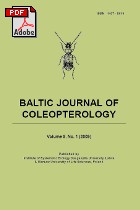Distribution and spatial preferences of Carabid species (Coleoptera: Carabidae) in a forest-field landscape in Poland
Main Article Content
Keywords
:
Carabidae, succession, bioindication, landscape, MIB
Abstract
The Carabid fauna of the research object "Krzywda" (west Poland), which is composed of forests and open areas of different stage of succession, was studied over a period of four years (2004-2007) using 53 pitfall traps placed in a grid. The study was aimed to answer the questions, whether (1) the different spatial elements of the research area are characterised by differences in stage of succession and (2) the dominant species show spatial preferences in the research area. Altogether, 13004 individuals from 98 species were collected. Five species, namely Calathus erratus, Calathus fuscipes, Harpalus rubripes, Harpalus tardus and Poecilus versicolor, were collected with more than 1000 individuals. Together, these five species make up 52.6 % of all collected specimens. Comparing the different years of the study, the total species numbers stayed relatively constant, whereas total individual numbers as well as numbers of individuals of the dominant species showed comparatively high fluctuations. The different landscape elements of the research object are characterized by different MIB values, clearly indicating differences in stage of succession. All of the dominant species are characteristic for young stages of succession. Calathus erratus, Calathus fuscipes and Harpalus rubripes preferred very young stages of succession, Harpalus tardus showed a rather balanced distribution and Poecilus versicolor preferred somewhat advanced stages of succession. The conclusion is drawn that Carabid beetles are useful indicators to distinguish even small differences in stage of succession. However, sets of species with indicator value should be established under consideration of habitat type and geographical regions.
Article Details
Statistics
Downloads
Download data is not yet available.
Recommend Articles
